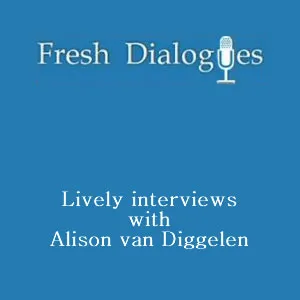Cambridge Future Cities Conference: BBC Report
- Author
- Alison van Diggelen
- Published
- Wed 26 Jul 2017
- Episode Link
- https://www.freshdialogues.com/2017/07/26/cambridge-future-cities-conference-bbc-report/
How will future cities deal with our growing transport challenges, and the security and privacy of our data? MIT professor Carlo Ratti explored these challenges at this year’s Future Cities Conference in Cambridge, England. Alison van Diggelen, host of Fresh Dialogues reports for the BBC World Service.
Photo caption: MIT Professor, Carlo Ratti in conversation with Alison van Diggelen at the Future Cities Conference, Jesus College, Cambridge on July 18, 2017.
On Monday, I joined the BBC’s Roger Hearing and Delhi journalist Madhavan Narayanan to discuss future cities and the role of technology in making them more efficient and sustainable. Listen to the podcast at the BBC’s Business Matters (Future Cities segment starts at 26:34)
Or listen to the audio clip below:
http://www.freshdialogues.com/wp-content/uploads/2017/07/Smart-Cities-report-by-Alison-van-Diggelen-on-BBC-BusinessMatters-July-25-2017.mp3
.
Here’s a transcript of our conversation (edited for length and clarity):
BBC Host, Roger Hearing: Alison, you’ve been having an interesting time recently. You’ve been looking at the concept of Future Cities, in fact you’ve been over in Europe I believe? Give me a picture of what you’ve been doing and what you’ve been hearing.
Alison van Diggelen: I was back at Cambridge University, in England last week, exploring the role of technology in shaping our future cities. The Cambridge Future Cities Conference assembled experts from academia, policy making and business to explore the challenges and opportunities facing cities. I interviewed Professor Carlo Ratti. He’s Director of the “Senseable City” Lab at MIT. “Senseable” as in sensors. He and his team are adding sensors to everything from trash to taxis to discover patterns, inefficiencies and opportunities to reinvent future cities, and make them greener and more sustainable. His team collaborated with Uber to test the feasibility of car-sharing and the Uberpool in New York. They found that in theory, everyone could travel on demand with just one-fifth (20%) of the number of cars in use today. He calls it the future mobility web.
Prof. Carlo Ratti: If you think about the future you can imagine something that we started calling a mobility web. A mobility web means the potential to know in real-time all the potential for transportation in the city both for people and parcels. Think about what happens today, you need to open one app, then another app…Imagine if all of them were combined… Then you can do something similar to what you do today with Kayak or Expedia, you can scan all your options – it’s like a mobile web that can radically change the way we look at mobility both for people and for goods.
Roger Hearing: Madhavan, you’re in Delhi. Can you imagine that kind of thing working in a city like Delhi? Would you be able to take transport to the point where you could be aware where every car or bus or lorry is at any given moment?
Madhavan Narayanan: Let me take a cynical view of what these guys at Stanford etc. do…I call them the Marie Antoinettes of our time. “Let them have high tech” is the new “let them eat cake.” Tech innovations have to be much more culturally sensitive and pragmatic for things to come on fast. People are not trying to reduce the carbon footprint here…people are trying to save money. High techies need to hire more sociologists and anthropologists and instead of talking to each other in an echo chamber of technologists. It will catch on in a zig-zag way…We do not need California idealism, we need Asian pragmatism.
Roger Hearing: Do you take that point on board Alison?
Alison van Diggelen: Absolutely. One of the refrains people heard at the conference was: let’s get out of our silos here: use this multi-disciplinary approach. We need collaboration, we need to think about different cultures and communities. In America 42 hours a year are lost due to traffic congestion(per [...]
